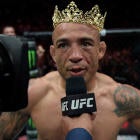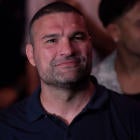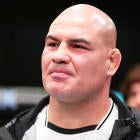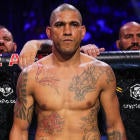LOS ANGELES -- Despite a trio of drug test abnormalities in as many years, Jon Jones no longer believes there will be asterisks associated with his name historically as the former UFC light heavyweight champion embarks on a quest for the one title that has alluded his legacy: vindication.
If only it were that easy.
"In my mind, there is no asterisks," Jones said during Thursday's final UFC 232 press conference. "I was afraid there would be asterisks next to my career when I was uneducated, but as I'm learning what this is, I'm mad that this was almost mentioned. It's invisible, you can't knowingly take a pictogram. That's how small it is."
The "pictogram" Jones erroneously referenced is actually a picogram, and represents the minuscule amount of a banned steroid metabolite that was found in his system during a Dec. 9 drug test. USADA chose not to rule the development a failed test, instead announcing it as "an atypical finding," which led to a licensing issue in Nevada and an unheralded decision to move Saturday's card to a different state on just six days' notice.
Jones (22-1, 1 NC) might be hoping his critics would buy his story at face value and turn their attention back to his long-awaited rematch against Alexander Gustafsson, which will be contested for the 205-pound title that Daniel Cormier currently owns and Jones has been stripped of a record three times. But referencing anything but his drug history this week would be impossible.
Despite the fact that UFC president Dana White steadfastly proclaimed Thursday that "USADA would never put their entire reputation on one guy," that's seemingly exactly what happened. The drug-testing agency claimed Jones' irregular test, for the same substance he failed a test for in 2017, was left over in his system and wasn't the result of a new violation or any recent use.
The problem with that from the standpoint of an understandably critical MMA media is that USADA reportedly informed other fighters suspended in recent years for offenses similar to Jones (including Frank Mir and Tim Means) that such a scenario was impossible. In addition, USADA made a number of claims this week about Jones' situation but never actually proved publicly how they knew these claims to be true, instead citing unnamed scientists and experts.
Asked repeatedly about the lack of information regarding the science behind UFC's confidence in Jones' innocence, White angrily deferred to UFC's vice president of athlete health and performance Jeff Novkitzy, who conveniently wasn't present. Asked further about angry undercard fighters who weren't told the card was moving cities and now must pay increased medical exam costs and higher state income tax in California, White chose to stick with an "it is what it is" defense.
"Let Novitzky answer that question for you, he's the expert on this," White said about the test results before advising Jones not to answer the question. "If you want to talk drugs, talk to Novitsky."
When a female reporter continued to press White about why he would allow Jones to continue to headline major pay-per-view shows -- especially considering White vowed he never would after failing a test ahead of UFC 200 -- when trouble continues to follow him, the press conference turned nasty.
"Sit down!" Jones said. "Do better journalism. You suck. Who is this girl? Why are you here?"
What has been so difficult to swallow for critics of Jones is how often he has portrayed a victim mentality in light of chronic personal problems that have often been brought on by himself. From Jones' perspective, his path toward vindication after a string of flimsy excuses and star treatment from both UFC and USADA will be that of a martyr and agent of change for the current drug testing system.
The major problem with that is how much Jones has benefitted from preferential handling that exceeds the natural excuse of "because he draws money." For a fighter seemingly so undeserving of a "benefit of the doubt," Jones somehow finds a way to gain more of it each time his troubles increase in ways that other fighters couldn't dream of.
"People are saying Jon must be paying off USADA, which is impossible," Jones said. "You think if Lance Armstrong can't afford to pay them off that I can? It's ridiculous.
"No one said it should be easy being who I am. I accept the difficult challenge."
Ironically, it was Armstrong himself, the disgraced cycling star, who lashed out publicly against USADA and UFC on Thursday in an Instagram comment responding to UFC commentator Joe Rogan posting an interview on his podcast with Novitsky, a former agent with the U.S. Food and Drug Administration who helped investigate Armstrong's performance-enhancing drug use.
"Why the double standard for Jones and others?" Armstrong wrote. "And let's get right to it -- what does the science and scientists say? I think I know the answer but let's let the star f---er speak to it."
If everything Jones has ever said regarding his alleged PED use is real, this week's developments could change the face of drug testing in UFC by further clouding even USADA's understanding of how long banned substances stay in fighters' systems, especially considering Jones tested clean in eight pervious tests during training camp.
But that remains a big "if," especially considering other fighters haven't been given the same chances by both UFC and USADA once they popped dirty. Most also couldn't afford the lengths Jones went into arbitration to get a suspension as a two-time offender unprecedentedly reduced from a possible 2-4 years down to 15 months retroactive, which ruled him eligible in October.
For Jones to be believed as routinely innocent regardless of his circumstances, one would have to believe he's the unluckiest fighter in UFC history who continues to find himself the luckiest once it becomes time for punishments to be handed out. Instead, many of his critics -- including Gustafsson, who openly called Jones "a cheater" on Thursday -- see him as the sport's biggest con man.
"Half the people that are judging me haven't opened up a chemistry book since high school," Jones said. "This shit is so small, it probably shouldn't have been brought up. This shit is so small. Even though it was in me, I think this is a way to fix a wrong and make it right again by not cancelling this fight and leaving it on for the fans. Even though a lot of fans got hurt in this situation, we saved the event."
Any hope of saving Jones' difficult legacy and removing the asterisk of PEDs seems like a difficult notion at the moment considering he's equally the G.O.A.T. and the one elite fighter who appears so hellbent on using the second half of his prime to spoil his own accomplishments.
Regardless of where you stand considering Jones' excuses, the general public has a knack for short memories in the face of dominant success.
"Jon Jones needs to go out on Saturday and keep winning and all of the negativity will go away," White said.
White, who revealed that moving the card to Los Angeles cost UFC upwards of $6 million, repeatedly referenced how he felt "it was the right thing to do." Until a believable alibi exists, doubting Jones' defense seems just as logical of a default setting.





















